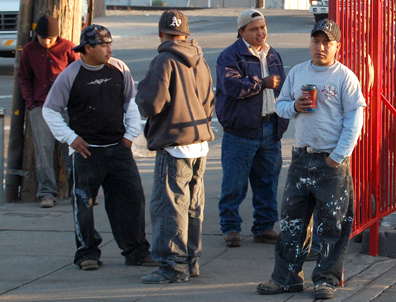
Immigrants are not the cause of high unemployment and low wages among U.S. born minority workers, according to a recent announcement by the Immigration Policy Center (IPC).
“Evidence suggests that there is no correlation between high levels of immigration and high unemployment among native-born workers.” According to scholar Gerald Jaynes the impact on less-educated native-born workers of competition with immigrant workers is affected by other factors such as declining factory jobs. IPC based its conclusions, however, from studies that looked only at the African American community against immigrant workers.
Black lawmakers in Washington recently accused Republicans of trying to create tension between African Americans and immigrants - Republican members of the House of Representatives argued in a hearing that more minorities would be working were it not for illegal immigration.
Republican Elton Gallegly argued that the “real victims of the failed immigration policies” are low-skilled legal workers.
Rep. Lamar Smith, a Texas Republican, stated that after Immigration and Customs Enforcement (ICE) raided Georgia Crider Inc., which had 600 jobs filled by people not working in the country legally, the company raised wages $1 an hour and attracted legal workers, primarily black Americans.
“With unemployment at over 9 percent for 21 months, jobs are scarce. And that is especially true in minority communities across the U.S.,” Smith said.
A new report by the Pew Hispanic Center provides a broader picture.
“We found that in the year following the official end of the recession in June 2009, foreign-born workers, who make up 15.7% of the labor force, gained 656,000 jobs while native-born workers lost 1.2 million. As a result, the unemployment rate for immigrant workers fell 0.6 percentage points during this period (from 9.3% to 8.7%), while for native-born workers it rose 0.5 percentage points (from 9.2% to 9.7%).”
According to the report, the fourth quarter of 2010 was the first period since the middle of 2008 that native-born workers have experienced positive jobs growth (growth being measured as the change over the same quarter in the previous year).
“For foreign-born workers, the fourth quarter of 2010 marks the third successive period of jobs growth. Thus, the economic recovery now appears to be benefiting all workers, although the gains to native-born workers have been a bit later in coming.”
The report points out that the jobs recovery has been far from complete for either group of workers. “From the beginning of the recession in the fourth quarter of 2007 to the fourth quarter of 2010, native-born workers lost 6.1 million jobs, a drop of 4.9%, and foreign-born workers lost 262,000 jobs, or a drop of 1.2%. The unemployment rate for native-born workers is up from 4.6% to 9.0% and for immigrants it is up from 4.5% to 9.9%.”
The initial stage of the economic recovery has proceeded differently for native-born and foreign-born workers, which could be due to greater flexibility of immigrants, says the report. Other research suggests that immigrants are more mobile than native-born workers, moving more fluidly across regions, industries and occupations.
